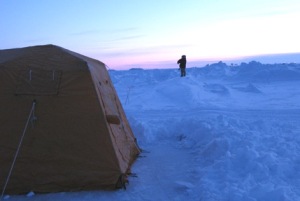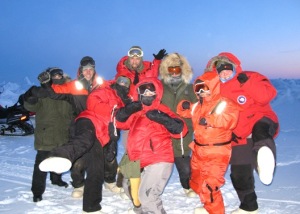Dr. Marc Frischer continues his account of his research expedition to the north coast of Alaska.
Today was the day. The weather was relatively mild (only -25 deg F); the crack seems stable; and everyone was ready to go. So, after a brief lesson in snow machine operations, we were off.
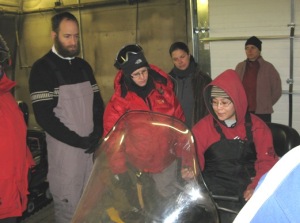
Snow machine lesson. Deb is a serious study (Instructor is UMIAQ employee Alice Drake – more about Alice later)
Because of the ice conditions we had to locate our camp a bit closer to shore and in shallower waters than we would have liked. 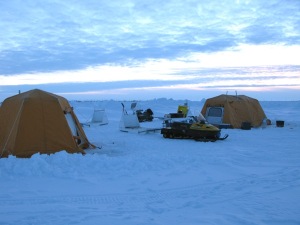 We prefer to be in deeper water to be assured that we are sampling coastal ocean water. We would like to be about another half or ¾ mile offshore. However, being closer to shore does has some advantages. The camp is only about 2/3 miles away from our labs (as the crow flies) and 1.3 trail miles. This means that even going slow it only took us about 15 min to get to the camp.
We prefer to be in deeper water to be assured that we are sampling coastal ocean water. We would like to be about another half or ¾ mile offshore. However, being closer to shore does has some advantages. The camp is only about 2/3 miles away from our labs (as the crow flies) and 1.3 trail miles. This means that even going slow it only took us about 15 min to get to the camp.
Arriving at the camp our logistic support team quickly set-up the generators and heaters, established a bear watch
and then let us get to work. We quickly assessed the conditions to make some decisions about sampling. The ice is about 0.9 meters (2.95 ft) and the depth was approximately 10 meters (33 ft). For geographic geeks, the camp is located at 71° 17’ 30’’N 156° 45’ 55’’W.
I also attempted to measure some basic water quality parameters to get a sense of the structure of the water column, but alas, the instrument we were using didn’t seem to have liked being frozen during the trip out to the camp. However, even if we can’t trust the numbers, they did suggest that the water was less salty then expected and that there was a salinity gradient from the surface to the bottom. We were hoping this wouldn’t be the case, but it was one of our concerns being so close to shore. We’ll see how this affects our results. Regardless, it will be interesting and we will learn something new about the microbes in the Arctic coastal ocean during the winter.
Sampling couldn’t have gone more smoothly. 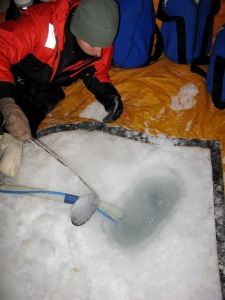 Everyone worked together, the equipment performed well with the possible exception of our temperature, salinity, and dissolved oxygen instrument. All our preparation paid off in spades. After about 2 hours we were ready to return to the labs to start processing the water that we had collected. So with the sleds loaded up and all of us just a bit colder, we headed back. This time the sleds were much heavier so it was a bit more treacherous.
Everyone worked together, the equipment performed well with the possible exception of our temperature, salinity, and dissolved oxygen instrument. All our preparation paid off in spades. After about 2 hours we were ready to return to the labs to start processing the water that we had collected. So with the sleds loaded up and all of us just a bit colder, we headed back. This time the sleds were much heavier so it was a bit more treacherous. 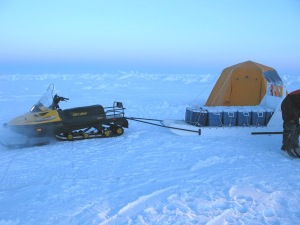
Zac managed to toss me off the back of the sled when he hit a particularly rough spot. That in itself wouldn’t have been so bad (no damage done), but he didn’t notice that I had fallen off and he continued. Luckily we weren’t the last ones in the convoy, and Alice Drake was kind enough to pick me up and run me back to my sled which had finally stopped when Zac eventually realized I wasn’t there. Advice to graduate students, it is not very smart to dump your advisor on the ice and take off!
After dinner, a huge pasta and chicken parmigiana meal at the cafeteria which really hit the spot, we spent the rest of the evening cleaning-up and documenting our days work. Tomorrow will be a day in the lab where we’ll purify RNA from some of our samples and get everything ready for the next sampling event. Hopefully on Friday.
Until then,
marc



